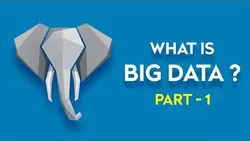
Hadoop Tutorials for Beginners 
This Hadoop Tutorials for Beginners course provides an introduction to Big Data and covers topics such as HDFS Architecture, MapReduce, Hive, Pig, Spark, NoSQL, HBase, Sqoop, Flume, and Kafka. It is designed to help beginners understand the basics of Big Data and how to use Hadoop to process and analyze it. The course is comprehensive and provides detailed explanations of each topic, making it an ideal resource for anyone looking to learn more about Big Data and Hadoop. ▼
ADVERTISEMENT
Course Feature
![]() Cost:
Cost:
Free
![]() Provider:
Provider:
Youtube
![]() Certificate:
Certificate:
Paid Certification
![]() Language:
Language:
English
![]() Start Date:
Start Date:
On-Demand
Course Overview
❗The content presented here is sourced directly from Youtube platform. For comprehensive course details, including enrollment information, simply click on the 'Go to class' link on our website.
Updated in [February 21st, 2023]
Big Data Basics Tutorial | An Introduction to Big Data | Big Data Tutorial For Beginners Part-1.
HDFS Architecture Tutorial | Introduction to HDFS | Big Data Tutorial For Beginners Part -2.
MapReduce in Hadoop | Introduction to MapReduce | Big Data Tutorial for Beginners Part -3.
Hive Tutorial For Beginners | Introduction to Hive | Big Data Tutorial for Beginners Part -4.
Pig Tutorial for Beginners | What is Pig in Hdoop? | Big Data Tutorial for Beginners Part -5.
Spark Tutorial for Beginners | Introduction to Spark | Big Data Tutorial for Beginners Part -6.
NoSQL Tutorial for Beginners | Introduction to NoSQL Databases | NoSQL Databases Tutorial.
HBase Tutorial | Introduction to HBase | What is HBase? | HBase Tutorial for Beginners.
Introductio to HBase Command Line | HBase Shell Commands | HBase Tutorial.
Hadoop Sqoop Tutorial | Introduction to Sqoop | Big Data Tutorial for Beginners Part - 10.
What is Flume in Hadoop | Introduction to Flume | Big Data Tutorial for Beginners Part 11.
Kafka Tutorial for Beginners | Introduction to Kafka | Big Data Tutorial for Beginners Part -12.
(Please note that we obtained the following content based on information that users may want to know, such as skills, applicable scenarios, future development, etc., combined with AI tools, and have been manually reviewed)
This Hadoop Tutorials for Beginners course provides an introduction to the fundamentals of Big Data and Hadoop. Learners will gain an understanding of the basics of Big Data, HDFS architecture, MapReduce, Hive, Pig, Spark, NoSQL databases, HBase, Sqoop, Flume, and Kafka. They will also learn how to use the Hadoop command line and HBase shell commands.
Learners will gain an understanding of the fundamentals of Big Data and Hadoop, including the basics of Big Data, HDFS architecture, MapReduce, Hive, Pig, Spark, NoSQL databases, HBase, Sqoop, Flume, and Kafka. They will also learn how to use the Hadoop command line and HBase shell commands. This course will provide learners with the knowledge and skills necessary to work with Big Data and Hadoop.
This course is ideal for those who are new to Big Data and Hadoop and want to gain an understanding of the fundamentals. It is also suitable for those who are already familiar with Big Data and Hadoop and want to deepen their knowledge. The course provides a comprehensive overview of the topics and provides learners with the opportunity to practice their skills in a hands-on environment.
This course is a great starting point for learners who want to gain an understanding of Big Data and Hadoop. It provides a comprehensive overview of the topics and provides learners with the opportunity to practice their skills in a hands-on environment. It is also suitable for those who are already familiar with Big Data and Hadoop and want to deepen their knowledge.
[Applications]
After completing the Hadoop Tutorials for Beginners course, learners can apply their knowledge to a variety of tasks. They can use HDFS to store and manage large datasets, use MapReduce to process data in parallel, use Hive to query data stored in HDFS, use Pig to analyze large datasets, use Spark to process data in real-time, use NoSQL databases to store and manage unstructured data, use HBase to store and manage large datasets, use Sqoop to transfer data between Hadoop and relational databases, use Flume to collect, aggregate, and move large amounts of data, and use Kafka to process streaming data.
[Career Paths]
1. Hadoop Administrator: Hadoop Administrators are responsible for managing, configuring, and maintaining Hadoop clusters. They are also responsible for ensuring the security and performance of the Hadoop clusters. The demand for Hadoop Administrators is increasing as more organizations are adopting Hadoop for their data processing needs.
2. Big Data Analyst: Big Data Analysts are responsible for analyzing large datasets and extracting meaningful insights from them. They use various tools and techniques such as Hadoop, MapReduce, Hive, Pig, and Spark to analyze and interpret data. The demand for Big Data Analysts is increasing as organizations are looking to gain insights from their data.
3. Data Scientist: Data Scientists are responsible for analyzing large datasets and extracting meaningful insights from them. They use various tools and techniques such as Hadoop, MapReduce, Hive, Pig, and Spark to analyze and interpret data. The demand for Data Scientists is increasing as organizations are looking to gain insights from their data.
4. Machine Learning Engineer: Machine Learning Engineers are responsible for developing and deploying machine learning models. They use various tools and techniques such as Hadoop, MapReduce, Hive, Pig, and Spark to develop and deploy machine learning models. The demand for Machine Learning Engineers is increasing as organizations are looking to leverage machine learning to gain insights from their data.
Course Provider

Provider Youtube's Stats at AZClass
Discussion and Reviews
0.0 (Based on 0 reviews)
Explore Similar Online Courses

Flutter Complete Course 2021 Android & iOS Flutter Tutorial for Beginners 2021 Dart & Flutter Firebase Tutorials Complete Developers Guide 2021

Intro To Storytelling: Wow Your Crowd

Python for Informatics: Exploring Information

Social Network Analysis

Introduction to Systematic Review and Meta-Analysis

The Analytics Edge

DCO042 - Python For Informatics

Causal Diagrams: Draw Your Assumptions Before Your Conclusions

Whole genome sequencing of bacterial genomes - tools and applications

MapReduce and YARN

Hadoop Developer


Start your review of Hadoop Tutorials for Beginners